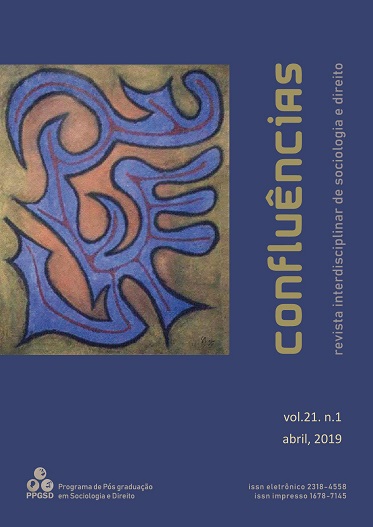THE INTERNATIONAL CRIMINAL COURT AND GENDER ISSUES: The representativeness and the crime of forced pregnancies.
DOI:
https://doi.org/10.22409/conflu21i1.p607Keywords:
International Criminal Court, Representativeness, Forced pregnancy.Abstract
The present work presents the gender issues addressed in the International Criminal Court, conducting analyses on representativeness, as well as on the typification of the crime of forced pregnancies. To this end, the work is based on the feminist theory of the law, so that the analysis can be done by a different way from the traditional, that is, patriarchal and cast and that contributes to the perpetuation of the violations. In the perspective of the feminist theory of law, the assistance to women victims of violence is a state obligation, regardless of the crime of forced pregnancies, in view of the principle of the dignity of the human person. In this sense, it is the indistant duty of the State to safeguard the rights of choice and self-determination of women and, consequently, their fundamental right to health, placed at risk when abortion needs to be carried out clandestinely, without proper and correct Conditions for its realization.
Downloads
References
ALONSO, Héctor O. Artigo 25 (1) – (3) (a): Responsabilidade Individual e Autoria. In: BRANT, L.; STEINER, S. O Tribunal Penal Internacional: Comentários ao Estatuto de Roma. Belo Horizonte. Editora Del Rey. 2016.
AMARAL JUNIOR, Alberto do. O Direito de assistência humanitária. Rio de Janeiro: Renovar. 2003
CASSESE Antonio, GAETA Paola. Cassese's International Criminal Law. OUP Oxford, 2003
CHARLESWORTH, Hilary. Feminist Reflections on The Responsibility to Protect. In: Global Responsibility to Protect 2, 2010, pp. 232 – 249. Disponível em: . Acesso em: 19/03/2016.
CRAWFORD James; OLLESON Simon. The Character and Forms of International Responsibility. In: EVANS. Malcolm. International Law. Oxford University Press. 2010
DAL RI Jr, Arno; ZEN, Cássio. Entre Versailles e Roma. In: BRANT, L.; STEINER, S. O Tribunal Penal Internacional: Comentários ao Estatuto de Roma. Belo Horizonte. Editora Del Rey. 2016
FARIAS, BRAGA NETTO e ROSENVALD, Nelson. Novo Tratado de Responsabilidade Civil. São Paulo: Atlas. 2015
GIL, Alicia Gil. Artigo 7: Crimes Contra a Humanidade. In: BRANT, L.; STEINER, S. O Tribunal Penal Internacional: Comentários ao Estatuto de Roma. Belo Horizonte. Editora Del Rey. 2016
JOÃO PAULO II. A Santa Sé. Carta Encíclica. Evangelho Vittae do Sumo Pontífice João Paulo II aos Bispos. Aos Presbíteros e Diáconos, Aos Religiosos e Religiosas. Aos Fiéis Leigos e a todas as pessoas de boa vontade sobre o valor e inviolabilidade da vida humana. Disponível em: . Acesso em: 05 de mai. 2017.
LAMOUNIER, Gabriela. Reflexões sobre o Tribunal Penal Internacional. 1. ed. Belo Horizonte: Editora, 2011.
MARKOVIC, Milan. Vessels of Reproduction: Forced Pregnancy and the ICC, 16Mich. St. J. Int'l L. 439, 2007. Disponível em: http://scholarship.law.tamu.edu/facscholar/163. Acesso em: Março de 2017
ODIO-BENITO, Elizabeth. A perspectiva e o mandato de Gênero no Estatuto de Roma. In: BRANT, L.; STEINER, S. O Tribunal Penal Internacional: Comentários ao Estatuto de Roma. Belo Horizonte. Editora Del Rey. 2016
ORGANIZAÇÃO DAS NAÇÕES UNIDAS (ONU). Convenção de Genebra IV. Adotada a 12 de agosto de 1949 pela Conferência Diplomática destinada a Elaborar as Convenções Internacionais para a Proteção das Vítimas da Guerra, que reuniu em Genebra de 21 de Abril a 12 de Agosto de 1949.Entrada em vigor na ordem internacional: 21 de Outubro de 1950.
TRIBUNAL PENAL INTERNACIONAL (TPI). Estatuto de Roma. 2002.







